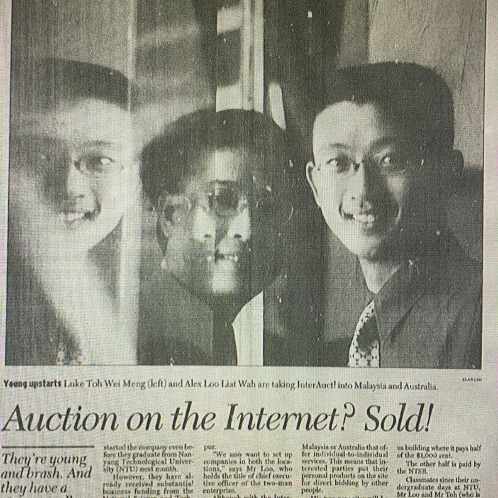WELCOME TO
InterAuct!
Dynamic Pricing Solutions since 1999
COVID 19 - Working From Home - Let's go 2023!
ABOUT

Founded in 1998, Funded in 99
Located then at the prestigious Science Park II along the Singapore Technology Corridor, InterAuct! [1] brainchild of university classmates Luke Toh and Alex Loo, was the first company to have received the Business Angel Fund [2], awarded by National Science and Technology Board, Singapore [3].
Active and still operational
Still headquartered in Singapore and active, the then internet based auction services provider [4] provided C2C auctions and revamped their business to provide B2C / B2B and also evolved their business into providing dynamic pricing solutions (forward auctions, reverse auctions, open bids, close bids second highest wins etc.) online and via the WAP protocol [5] to companies as white labelled, Software as a Service (SaaS) [6] to regional clients such as StarHub, American President Lines [7] and was involved in giving back to the community through National Day Ceremony Tickets Ballets and auctions for other charity / charitable causes[8].
Onward and upwards
Our early start up staff have themselves climbed the corporate ranks to program directors in global marketing agencies, technical architects for government transport divisions and corporate auditors in the big four firms.
Our Keywords: Trust is build upon continuous and up to date KYC, AML, POF, POI/A. These are important crucial elements to ensure authenticity of both the buy and sell sides leading to successful transactions. And as facilitators, InterAuct! seeks just that - successful transactions.
(1) E-auction service for businesses, Business Times, Singapore, 13 December 1999
(2) who.is domain registrar infomation provider
(3) InterAuct! to raise $5 million to push B2B, B2C, Business Times, Singapore, 8 May 2000
(4) The E-Cultural Revolution:Internet Auctions and their Impact on Buyer Behaviourin Singapore's Chinese Community, JAN 2000
(5) Mobile commerce business models and technologies towards success, Rochester Institute of Technology RIT Scholar Works, 2003
(6) E-Procurement in Emerging Economies: Theory and Cases: Theory and Cases, edited by Pani, Ashis K. IGI Global; 1st edition (January 29, 2007)
(7) https://www.zdnet.com/article/auction-portal-similan-to-charge-fees/
(8) EP1534838A4 - Plantes transgeniques bioluminescentes (auction of bioluminescent hybrid orchid) 2000_11
* Thanks JLL for The Aquarius picture
Theory behind the Fun
Dynamic Pricing
source: https://en.wikipedia.org/wiki/Dynamic_pricing
Dynamic pricing, also referred to as surge pricing, demand pricing, or time-based pricing is a pricing strategy in which businesses set flexible prices for products or service based on current market demands. Businesses are able to change prices based on algorithms that take into account competitor pricing, supply and demand, and other external factors in the market. Dynamic pricing is a common practice in several industries such as hospitality, travel, entertainment, retail, electricity, and public transport. Each industry takes a slightly different approach to repricing based on its needs and the demand for the product.
interesting facts:
https://crealytics.com/blog/dynamic-pricing-important/
https://www.pwc.com/ca/en/services/consulting/perspective-analytics/dynamic-pricing-the-secret-to-increasing-online-sales-and-loyalty.html
Auctions
source: https://en.wikipedia.org/wiki/Auction
An auction is a process of buying and selling goods or services by offering them up for bid, taking bids, and then selling the item to the highest bidder. The open ascending price auction is arguably the most common form of auction in use today. Participants bid openly against one another, with each subsequent bid required to be higher than the previous bid. Some frequent auctions used includes:
https://en.wikipedia.org/wiki/Forward_auction
https://en.wikipedia.org/wiki/Reverse_auction
https://www.investopedia.com/terms/s/sealed-bid-auction.asp

Game Theory
source: https://en.wikipedia.org/wiki/Game_theory
Game theory is the study of mathematical models of strategic interaction among rational decision-makers. It has applications in all fields of social science, as well as in logic, systems science, and computer science. Originally, it addressed zero-sum games, in which each participant's gains or losses are exactly balanced by those of the other participants. Today, game theory applies to a wide range of behavioral relations, and is now an umbrella term for the science of logical decision making in humans, animals, and computers.
What value, intangible assets?
Digitalisation in the real world
A digital asset, in essence, is anything that exists in a binary format and comes with the right to use. Data that do not possess that right are not considered assets; include but are not exclusive to: digital documents, audible content, motion picture, and other relevant digital data that are currently in circulation or are, or will be stored on digital appliances



